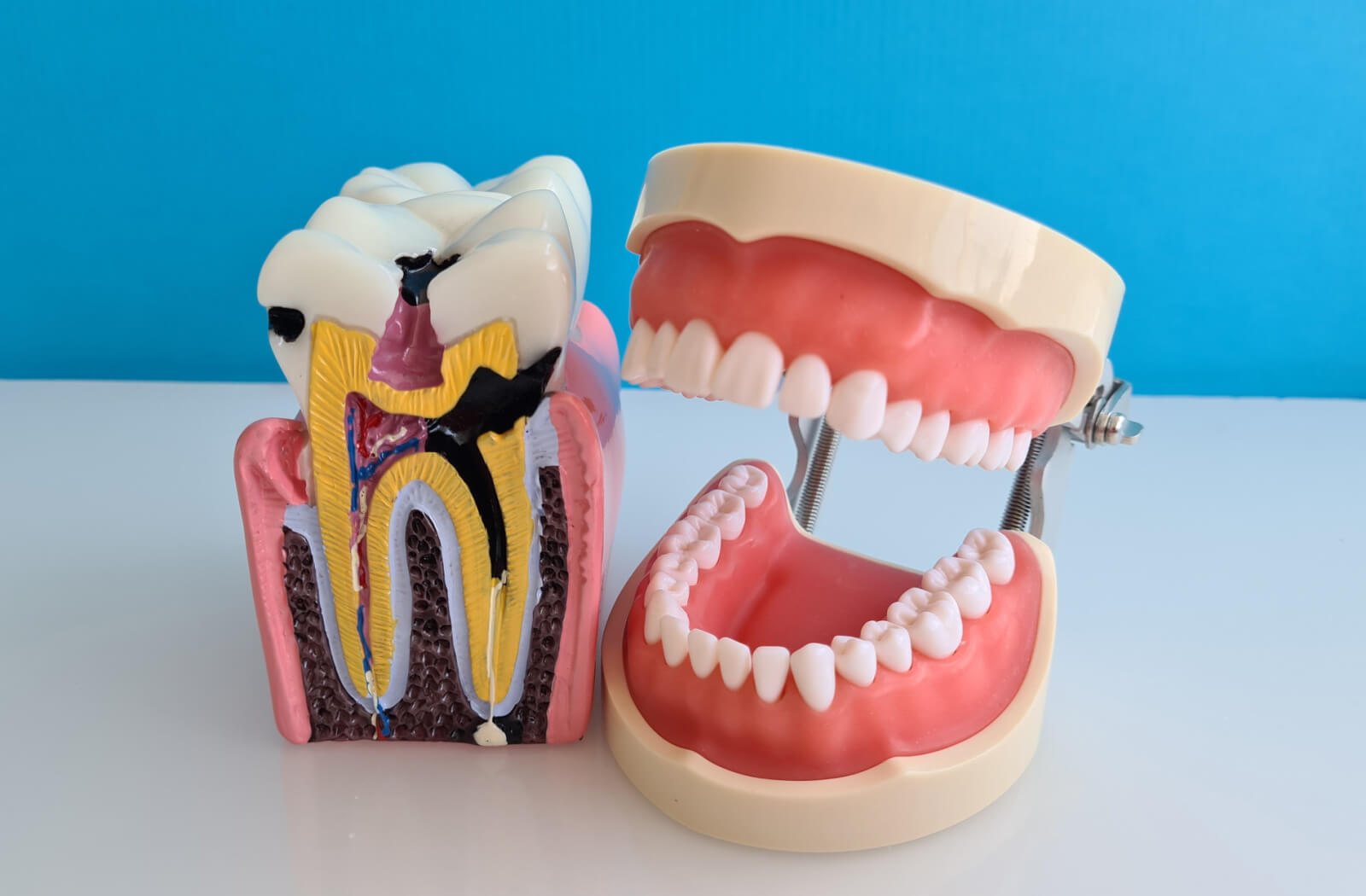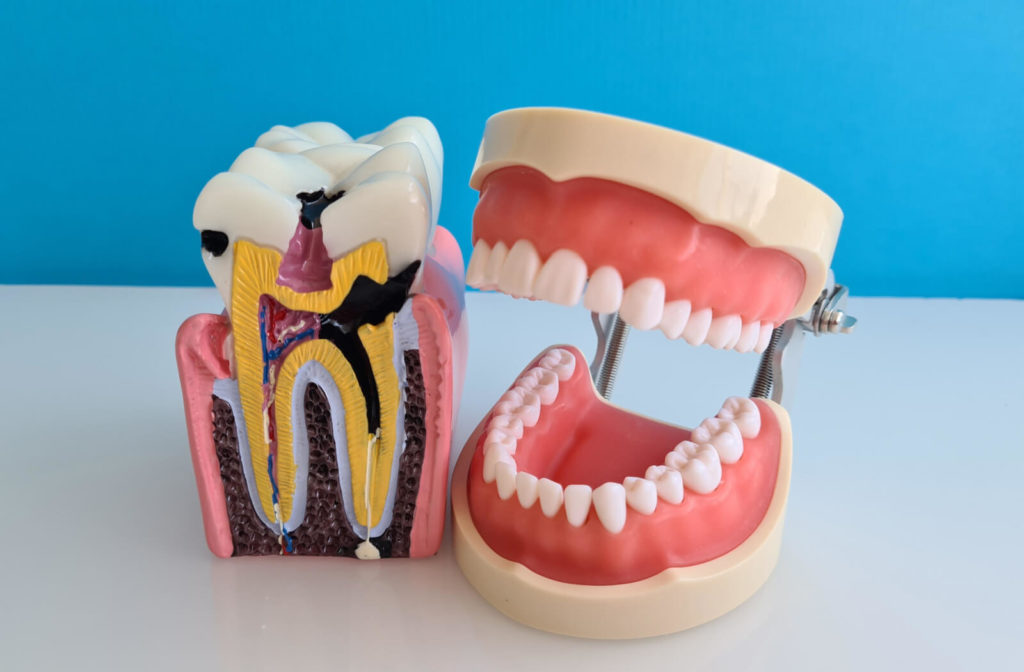Cavities can affect people of all ages. They’re an extremely common dental disease, and develop when bacteria in the mouth start to erode the tooth enamel. It leads to tooth decay and tiny holes in the teeth, and without proper treatment, can often become a much bigger problem. But are cavities contagious?
Because cavities are caused by bacteria, they are in fact contagious. They can be transmitted to others through saliva. This makes it crucial to get proper treatment if you have a cavity!
What Are Cavities?
Your teeth are made of several primary layers: the enamel, the dentin, and the pulp. The root, the innermost part, connects the tooth to the rest of you. It’s extremely sensitive.
The dentin makes up most of the tooth’s structure. It keeps everything together and adds strength and support, but if it’s exposed, it can become easily damaged. That’s where the enamel comes in—it keeps the more sensitive parts of the tooth properly protected. It’s like a shield for the rest of your tooth.
But this enamel is vulnerable to wear and tear. Whether through improper brushing or exposure to damaging foods and drinks, this enamel can weaken over time. Eventually, little gaps or holes can develop, creating an environment where bacteria thrive. This is a cavity.
Cavities often cause:
- Sensitivity
- Toothaches
- Visible holes
- Dark spots
- Inflammation and overall pain
So why do they develop?
Why Do Cavities Develop?
Cavities are primarily linked to the development of plaque. This is a sticky film that adheres to the surface of your teeth. It’s caused by bacteria feeding on sugars and producing an acid as a result. This plaque attacks the tooth enamel, and can gradually erode it over time.
These bacteria can be caused by:
- Excessive consumption of sugary foods and beverages
- Poor oral hygiene practices, such as infrequent brushing and flossing
- Dry mouth, which reduces saliva production and decreases natural protection against cavities
- Acidic foods and drinks that erode the tooth enamel
This means that bacteria play a significant role in whether or not you’re likely to develop a cavity. If your oral hygiene is poor, these bacteria keep producing an acidic film and continuously damage the tooth. Even though a cavity starts with the enamel, it can lead to much bigger problems if you aren’t careful.
Remember: the enamel is protecting the more sensitive parts of the teeth. If the cavity reaches the dentin, it can start to cause much more irritation and discomfort. Plus, it’s harder to properly clean, since it’s now underneath the protective layer of the tooth. The bacteria can spread, now in a secure gap in the tooth, and keep thriving.
And if it reaches the root of the tooth, it can cause severe pain and often requires a root canal or full tooth extraction.
Can You Give Someone a Cavity?
Cavities can be contagious—to a certain extent. Since cavities are caused by bacteria in the mouth, they can be directly transmitted through your saliva.
So if you have a cavity and come into close contact with a loved one, like sharing a kiss or a delicious bite of food, you’re potentially putting them at risk of developing a cavity as well. While this isn’t always guaranteed to occur, it is a possibility. This makes it essential to get treatment for your cavity! It isn’t just about you—you’re protecting your loved ones as well.
How Are Cavities Treated?
Fortunately, a cavity can be treated with the help of an experienced dental professional. Your dentist has the expertise and equipment needed to properly treat your cavity, so you’ll need to start by visiting your dentist. Then, we’ll likely recommend:
- A dental filling, where the decayed part of the tooth is removed and a special material fills the space
- A dental crown. If the cavity is extensive and has weakened the tooth structure, a dental crown may be necessary to provide strength and protection.
- A root canal. When the cavity reaches the pulp of the tooth, a root canal may be needed. The infected tissue is removed to try and save the tooth.
- A tooth extraction. In extreme cases, a full extraction may be required. However, this is usually a last resort and is fairly rare.
Can You Prevent a Cavity?
Fortunately, you can take some steps to try and prevent cavities. It can help to:
- Brush your teeth at least twice a day with fluoride toothpaste.
- Floss daily to remove plaque from between your teeth
- Limit your consumption of sugary foods and beverages, especially between meals.
- Drink plenty of water, which helps rinse away food particles and neutralize acids in the mouth.
- Use dental products that contain fluoride, as it strengthens the enamel and helps prevent cavities.
And don’t forget to regularly visit your dentist for checkups! They can examine your teeth and do a professional cleaning to reduce your risk of developing cavities.
What to Do if You Think You Have a Cavity
If you’re noticing symptoms related to cavities or suspect you may have one, don’t hesitate to visit Heritage Pointe Dental. Our convenient location in the South of Calgary is close to neighbourhoods such as Seton, Auburn Bay, Mahogany, Cranston, Legacy, Walden Chaparral, and Silverado. We’ll examine your teeth and give you up-to-date advice on avoiding cavities. Early detection and treatment can help you prevent further damage, and we’re here to help you with any and all of your dental needs. Book an appointment with us today!



